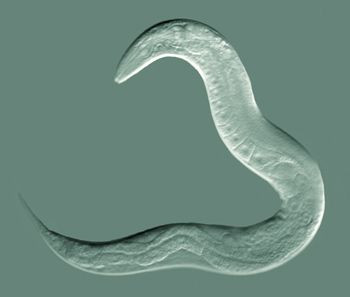A Sushi Parasite That Can Smell Cancer: Can Roundworms Be Used As A Diagnostic Tool?

In the past, researchers have found that dogs, rats, and even humans are able to identify cancer and other diseases through the sense of smell; even though they may not always be accurate, it’s an avenue scientists have wanted to further explore as a possible diagnostic tool. Now, a new study finds that parasites may be capable of doing something similar by detecting cancer in people’s urine.
“In existing tests, people must have different examinations according to the type of cancer they have,” Takaaki Hirotsu of Kyushu University in Japan, an author of the study, said. “Our odor-based test detected all nine types of cancer we tested.”
Along with co-author Hideto Sonada, Hirotsu was motivated to carry out the study after coming across a 63-year-old man who had a certain type of roundworm called Anisakis in his digestive system (this particular parasite is often found in raw fish and thus, sushi). Interestingly, the researchers found that the parasites had attached themselves to a lesion in his stomach that was an early sign of gastric cancer.
They wanted to see whether it was the parasites’ sense of smell that helped them identify the cancer, so the researchers placed droplets of culture medium that contained cancer cells on one side of petri dishes, and droplets of fresh culture medium on the other side. When they added the roundworm Caenorhabditis elegans to the petri dish, they found that the worms moved towards the cancer. When the researchers removed olfactory sense neurons in some of the worms, they didn’t move towards the cancer part of the dish — meaning it was indeed their sense of smell.
To test it in humans, the researchers placed worms near spots of urine from people who had cancer as well as people who didn’t have cancer; the worms moved towards the urine that had cancer in it — able to identify stomach, colorectal, colon, oesophageal, pancreas, bile duct, prostate, breast and lung cancer. They were correct 96 percent of the time, which is better than any blood test, the researchers argue.
Since 1970, 29 cases including this one have been recorded in which parasites have attached themselves to cancers. Many times, they do so when the cancer is in the early stages.
“It’s very surprising that the nematodes exhibited such a strong binary response to ‘cancer’ versus ‘no cancer’ urine,” Michael Phillips, who works at Menssana Research, which develops diagnostic tests based on people’s breaths, said. “We ought to suspend judgment on the test until it has been replicated in other labs using very careful controls.”
In the meantime, the researchers are planning on expanding research into developing a diagnostic product that could help identify cancer sooner versus later.
Source: Hirotsu T, Sonoda H, Uozumi T, Shinden Y, Mimori K, Maehara Y. “A Highly Accurate Inclusive Cancer Screening Test Using Caenorhabditis elegans Scent Detection.” PLOS One, 2015.



























